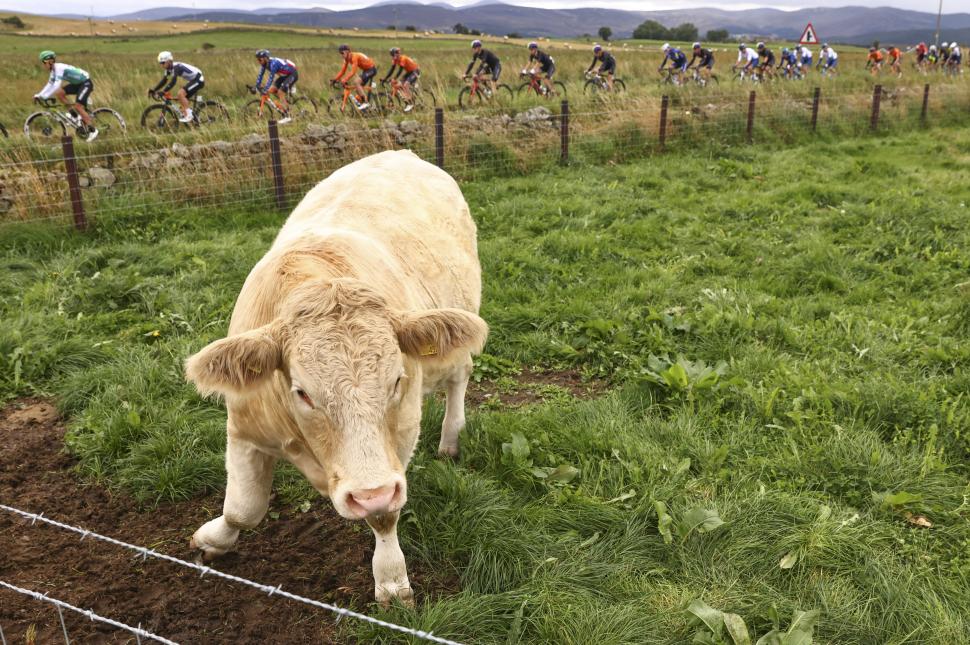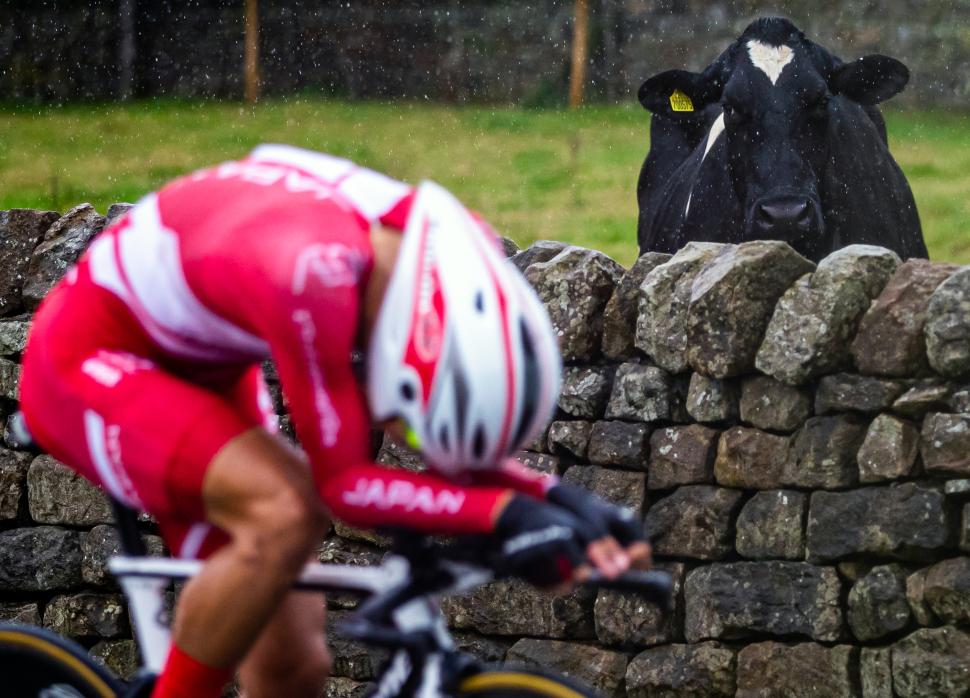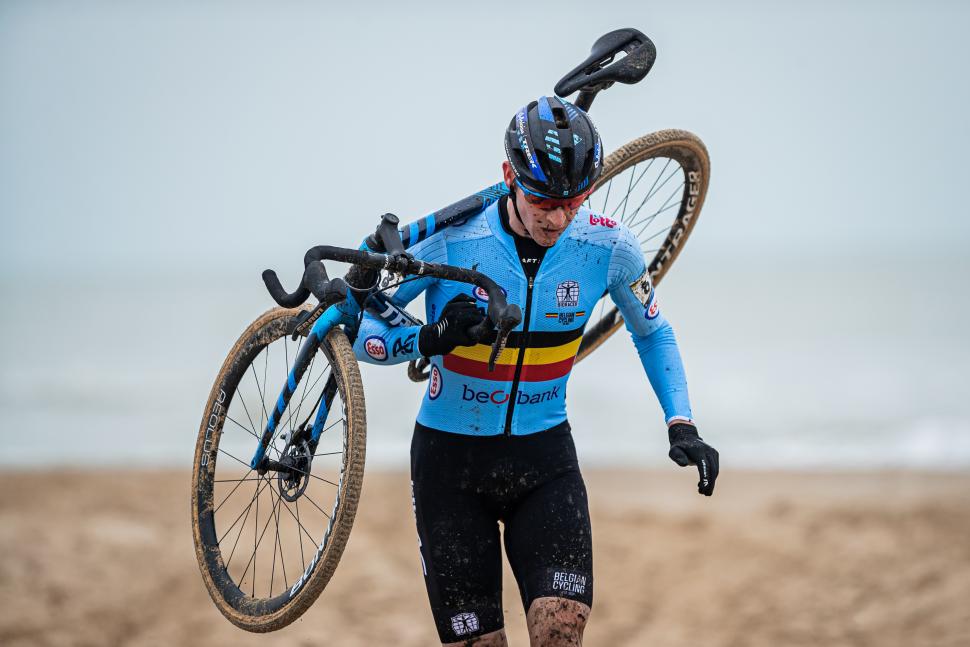- News
- Reviews
- Bikes
- Components
- Bar tape & grips
- Bottom brackets
- Brake & gear cables
- Brake & STI levers
- Brake pads & spares
- Brakes
- Cassettes & freewheels
- Chains
- Chainsets & chainrings
- Derailleurs - front
- Derailleurs - rear
- Forks
- Gear levers & shifters
- Groupsets
- Handlebars & extensions
- Headsets
- Hubs
- Inner tubes
- Pedals
- Quick releases & skewers
- Saddles
- Seatposts
- Stems
- Wheels
- Tyres
- Tubeless valves
- Accessories
- Accessories - misc
- Computer mounts
- Bags
- Bar ends
- Bike bags & cases
- Bottle cages
- Bottles
- Cameras
- Car racks
- Child seats
- Computers
- Glasses
- GPS units
- Helmets
- Lights - front
- Lights - rear
- Lights - sets
- Locks
- Mirrors
- Mudguards
- Racks
- Pumps & CO2 inflators
- Puncture kits
- Reflectives
- Smart watches
- Stands and racks
- Trailers
- Clothing
- Health, fitness and nutrition
- Tools and workshop
- Miscellaneous
- Buyers Guides
- Features
- Forum
- Recommends
- Podcast
 Highland cow watches the 2021 Tour of Britain, stage eight, to Aberdeen (SWpix.com)
Highland cow watches the 2021 Tour of Britain, stage eight, to Aberdeen (SWpix.com)Wake up to (anything but) milk: Pro cyclists warned not to eat or drink dairy products at cyclocross race after positive doping tests
As anyone who grew up in the UK in the 1980s will know all too well, a stubborn refusal to drink milk could have a catastrophic effect on one’s footballing abilities, condemning aspiring youngsters to a career of fruitless exertion for minnows like Accrington Stanley (Who are they? Exactly).
But for the pro cyclists descending on Normandy – where both Toon Aerts and Shari Bossuyt recently tested positive for the same drug – to race this weekend’s sixth round of the UCI cyclocross World Cup, the opposite could prove to be the case, with the riders’ management warning those taking part on Sunday to avoid consuming dairy products, lest the same anti-doping fate befall them.
Belgian cyclocross star Aerts and Canyon-Sram rider Bossuyt tested positive for the cancer drug Letrozole while racing in Flamanville, where this weekend’s World Cup round will be held.
Aerts received a two-year ban after submitting a positive out-of-competition doping control for the metabolites of the drug – which is primarily used to block oestrogen during the treatment of breast cancer, but is banned by WADA due to its ability to boost testosterone levels and reduce or prevent the feminising effects of anabolic steroid use – three days after racing the cyclocross World Cup round in Flamanville in January 2022.
Meanwhile, 2022 Madison world champion Bossuyt was racing at the Tour of Normandy – the second stage of which finished in Flamanville – when she tested positive for Letrozole.
While Letrozole is regarded by the UCI as a specified substance, meaning it does not come with an automatic provisional suspension, both Aerts and Bossuyt stepped back from racing as they attempted to find an explanation for their positive tests, which they claim were the result of a contaminated substance ingested while racing in Normandy.
(Alex Whitehead/SWpix.com)
And now, in a move that will surely anger the region’s farmers – similar to Alberto Contador’s infamous ‘tainted beef’ defence following his positive test for clenbuterol at the 2010 Tour de France – Yannick Prévost of ISEA Sport Management, who represents both Aerts and Bossuyt, has sent a warning to other riders in his stable, including European cyclocross champion Michael Vanthourenhout, telling them to avoid local dairy products while racing in Flamanville this weekend.
According to Sporza, the letter advised riders to bring their own food from Belgium and argued that the duo’s positives came about because dairy farmers in Normandy may be using Letrozole to synchronise their cows’ estrus cycles for fertilisation.
“That is why we have personally advised all our riders who will ride in Flamanville on Sunday to consume as little dairy products (such as yogurt and milk) from the region as possible. We also advised them to bring all their food with them from Belgium,” the management’s letter said.
“We still base this on our hypothesis that Toon and Shari tested positive after consuming dairy products in Flamanville. Their files show too many similarities to neglect this.
“Letrozole metabolite may be present in cow’s milk. Our hypothesis is that their positive test is due to this, but this has not been confirmed by laboratory analyses.”
At a press conference in June called to announce Bossuyt’s positive test, her manager Prévost insisted that the Canyon-Sram rider and Aerts were not dopers, but victims.
“We have been working on this file for a year,” Prevost said. “It is very difficult to prove that it is a contamination from food.
“We are walking a track, but we cannot yet make it concrete. What we can say is that Shari and Toon both tested positive after competitions in Normandy, in Flamanville to be precise.
“Letrozole is used for the fertilisation of cows and sheep. That is a relatively new technique. It is currently a hypothesis that we cannot yet substantiate. Because the food industry does not yet test for Letrozole.
“Shari and Toon are not doping users, but victims.”
(Alex Whitehead/SWpix.com)
One of cyclocross’ leading riders for much of the last decade, Aerts was banned by the UCI for two years at the start of 2023, backdated to the time of his positive test in February 2022, and stripped of any results obtained between 19 January and 5 February 2022.
Despite his contamination defence, which involved the 30-year-old growing his hair to enable medical analysis to be carried out, the UCI ruled that “after a thorough examination of the case, including several expert reports submitted by the Belgian rider, the Tribunal considered that Toon Aerts had failed to establish how the prohibited substance entered his body.”
Following the UCI’s verdict, the Belgian rider launched a fierce criticism of the governing body and its treatment of “flesh-and-blood people”.
“I never took doping and ever even considered it. After a year and a half in a legal tug-of-war, now portrayed as a cheater. Along with my entire family and surrounds suddenly labelled losers. It hurts and it doesn’t feel right,” he said in a letter posted on social media.
“Well here UCI, a bit and heartfelt middle finger! You could have made us the happiest people on earth… But who is Toon Aerts in the big circus of cycling?”
Aerts will be free to compete again from 16 February, just before the current cyclocross season ends, with recent reports in Belgian suggesting that he has signed a new two-year contract with the Deschacht-Hens-Maes team.
Meanwhile, 23-year-old Bossuyt – who won a stage of this year’s Tour of Normandy, where she recorded her positive test – is still pleading her case, but admitted last month that her dream of partnering Belgian teammate Lotte Kopecky in the Madison at next year’s Paris Olympics is “over”.
After obtaining a PhD, lecturing, and hosting a history podcast at Queen’s University Belfast, Ryan joined road.cc in December 2021 and since then has kept the site’s readers and listeners informed and enthralled (well at least occasionally) on news, the live blog, and the road.cc Podcast. After boarding a wrong bus at the world championships and ruining a good pair of jeans at the cyclocross, he now serves as road.cc’s senior news writer. Before his foray into cycling journalism, he wallowed in the equally pitiless world of academia, where he wrote a book about Victorian politics and droned on about cycling and bikes to classes of bored students (while taking every chance he could get to talk about cycling in print or on the radio). He can be found riding his bike very slowly around the narrow, scenic country lanes of Co. Down.
Latest Comments
- Rendel Harris 3 sec ago
How can you know that you are "equally fearful" as "any female cyclist"? There is no possible way of quantifying such emotions and female cyclists...
- chrisonabike 32 min 2 sec ago
I think it would be fairer to blame the moon - as in "my client is a loony".
- Bungle_52 55 min 27 sec ago
Nice idea but Gloucestershire Constabulary are not interested as exemplified by this prvious NMOTD. Not only was there NFA for the close pass in...
- quiff 1 hour 32 sec ago
The war years would work - 1917 (39 mill) or 1942 if you're rounding up (44 mill). Buy yes, it's been an upward trajectory since then.
- mctrials23 1 hour 6 min ago
Flippin heck!
- hawkinspeter 2 hours 27 min ago
I think black boxes are great for early detection of cognitive decline and/or sight problems. Someone's driving is going to become much less smooth...
- Bigtwin 3 hours 2 min ago
It's a fashion. https://guildford-dragon.com/shalford-driver-who-smashed-shalford-war-me...
- MTL Biker 3 hours 23 min ago
Robin Phans .....
- Rendel Harris 5 hours 4 min ago
Well it would be irresponsible enough if there were only cars and buses, if there are going to be "cars, buses and traffic" that's just suicidal...



Add new comment
9 comments
This sounds like clutching at straws. Letrozole is not currently approved for used in food producing animals within EU. I suspect a coach has been Googling the drug, found some experimental studies of its use in cattle and decided that's probably the easiest thing to use as scapegoats.
Within EU use of medication in food producing animals is tightly controlled, several safe and effective reproductive drugs are available for cattle and sheep, and are relatively inexpensive. Why farmers in one region would be using something unlicensed seems beyond me.
More on the practicalities and likelihood of farmer rule breaking? In order to use the drug it has to be available. The importation of medicinal products is tightly regulated, traceability matters whether human or veterinary. While the human formulation of tablets may be readily available under prescription, these are impractical for use in livestock. I find it implausible that farmer or vets would go to the cost and effort of importing of having a cattle formulation made, of a drug that cannot legally be used, for minimal benefit over affordable, legal, pre-existing medicines.
In short this excuse, professionally speaking, seems like cow ****
Call me cynical but the only commonality needed for 2 dopers is to have an enabler in common. Say perhaps a management team. 🤔
They are trying very hard to blame everyone else but themselves. Letrozole is prohibited in and out of competition. There's a good reason for that, as outlined in the article.
Its use in managing livestock fertility is a relatively recent idea and "still in the experimental stage, with many hurdles remaining before letrozole is approved for commercial use on farms" according to this article from 2020. [3Dec edited to add another quote from the Faculty of Veterinary Medicine at Ghent University casting doubt on its commercial use in agriculture here.]
So, if "dairy farmers in Normandy may be using Letrozole" as Prévost very vaguely claims, then I have some questions:
- does he actually know that Normandy farmers were using Letrozole on their herds? Have any milk samples been tested or questions been asked?
- Conversely, can he be sure that farmers outside Normandy are not using Letrozole? If it's used widely why has no-one been tested +ve for it before or since?
- did they check that the milk they bought (presuming the 2 riders did actually drink the milk in Flammanville) was locally produced? It may have been produced and bottled quite a distance away.
- dairy farmers don't use fertility drugs all year round. What are the chances of its presence in the bottles supposedly consumed by these 2 riders, a few months apart?
- the riders could easily avoid this and some other products by buying organic milk. Antibiotics, hormonal fertility treatments etc are not allowed in organic production.
Tis a flawed system though. No scope to prove any good reason and to be banned whilst you are trying is like being put in prison before your speeding fine.
With certain serious offences, such as drunk driving, your licence is suspended until trial, that would be a better analogy. Yes it's harsh on the innocent (how many of those are there, actually, though?) but doping is the biggest problem in pro cycling. Imagine if a certain Texan had been caught doping during his career but people were allowed to continue racing until proven guilty, with his lawyers and financial firepower he could probably have delayed matters for years and gone on racking up the wins. For the credibility of the sport it has to be you're out once you've tested positive and then have to prove, if you can, your innocence.
That's not quite true, the driver once charged is free to go once they give a clear breath test (after a day or night in the cells). They're free to make their own way back to their vehicle and drive until (if charged - remember if they blow under 35 back at the station on the evidential machine, no charge) the court appearance. This could be weeks or months afterwards. The exception would be say, a very high reading of 140 or more, in which case they'd be remanded in custody until court, and in this circumstance, that would be only a day or two after arrest. They'd still have a licence until being found guilty and the subsequent mandatory ban, but unable to drive while in the cells.
What system isn't flawed?
All competitors know the responsibility is on them. There isn't even any good evidence that Letrozole is being used in agriculture, as I outlined above. Having heard far too many "I would never cheat, I'm clean as the driven snow" claims made by lying, cheating dopers, I'm struggling to have sympathy for someone who has tested positive for a drug like this one.
Neither has lost a limb, had a mental health breakdown or been paralysed. They can get another job. Lots of people do that all the time, either by choice or necessity. Why should athletes be any different? Shit happens, deal with it.
To correct you, in spite of the nonense spouted by organic cheerleaders, anitbiotics are used therapeutically in both organic and conventional livestock farming, but in the case of dairy cattle, any milk produced is not permitted for human consumption.
Antibiotics have not been used for growth promotion purposes in the EU/ UK for 20 years (and never were used for dairy animals).
"hormones" were banned in the EU in the 1990s.
Correct, antibiotics are used in organic production as animal welfare is important. However, any dairy animal treated has to be taken out of the herd and the withdrawal period is doubled to ensure there is no residue. Frequent sampling is done by milk buyers and any contamination means the load is rejected and the source investigated. Soil samples are also taken regularly and sent to a lab for analysis. Any adverse finding will trigger an investigation.
Organic animal feeds have to be approved and tested, traceability done and supplier certificates checked for all ingredients. This is not done with 'conventional' (i.e. non-organic) animal feeds.